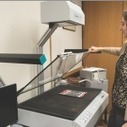It is not enough to write monographs. It is not enough to publish. Today, scholars must understand what happens when our research is distributed, and we must write, not for rarified audiences, but for unexpected ones. New-form scholarly publishing requires new-form scholarly (digital) writing. Digital academic publishing may on the surface appear as a lateral move from print to screen, but in fact it brings with it new questions about copyright, data analysis, multimodality, curation, archiving, and how scholarly work finds an audience. The promise of digital publishing is one that begins with the entrance of the written, and one that concludes with distribution, reuse, revision, remixing — and finally, redistribution.
Digital publishing is a field worthy of rigorous research and deep discourse. In a post-print environment, for example, social media — Twitter, Facebook, Pinterest, WordPress, or Tumblr — have supplanted the static page as the primary metaphors for how we talk about the dissemination of information. Digitized words have code and algorithms behind them, and are not arrested upon the page; rather they are restive there.



 Your new post is loading...
Your new post is loading...










